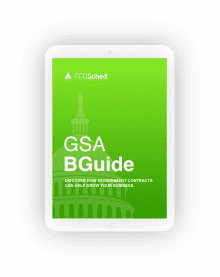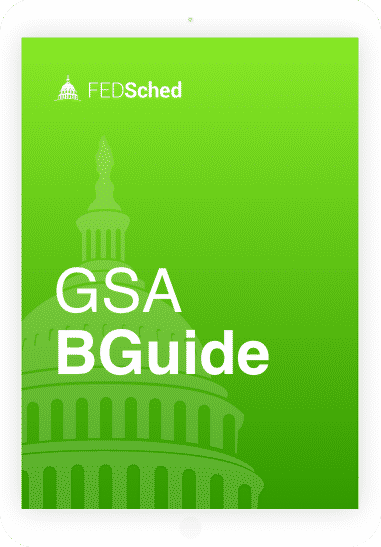It’s important to note, not all GSA consultants offer the same services or even level of service. Taking time to vet each prospective option before hiring a GSA consultant is critical. Asking the right questions upfront will help you select a firm with the reliability and expertise you need to achieve long-term success and sustainable growth.
To help you hire the best GSA consultant for your business, here are eight essential factors to consider:
1. Reputation
One of the first things you should consider when looking at prospective consultants is the reputation and success of each company. Review client testimonials and ask for references to get a sense of the firm’s client satisfaction. Glowing reviews, a positive reputation, and high client success rates are strong indicators you’re on the right path.
🚩Watch out for anonymous testimonials and a lack of references. These are red flags you should not ignore. A company with a less than stellar reputation is more likely to overpromise and underdeliver.
2. Years of Experience
When searching for a GSA consultant, years of experience are typically directly related to a company’s reputation and success rate. The solicitation governing the GSA Schedule is complex; it takes more than a few years to learn the ins and outs of the GSA proposal and modification process.
Additionally, the more years of experience, the more likely the consultant has worked with many different GSA Contracting Officers. Why does this matter? While GSA is continually working to standardize the proposal and modification process, many aspects are left to the discretion of the GSA Contracting Officer. Experience with a wide range of Contracting Officers helps a consultant better anticipate potential questions and requests during the GSA review process. Experience also helps a consultant identify standard versus out of the ordinary requests and respond accordingly.
🚩The fewer years of experience, the more likely you are to experience issues during the proposal or modification process. These issues could lead to delays, rejection, and/or missed opportunities in negotiating the best rates.
3. Expertise
The GSA Schedule is a unique and complex contract, which is why you are better served by a specialist versus a generalist. The fact that some of the top contractors with departments dedicated to government contracting still seek outside assistance with the GSA Schedule speaks to this.
Specific industry expertise is another factor to consider when making your decision. Depending on your industry, there may be specialized qualifications and certifications beyond the standard requirements. Expertise across all the GSA Large Categories helps you better plan and avoid surprises.
🚩If support for the GSA MAS Contract is only a portion of the consultant’s services, they may not be true experts in the field.
4. Level of Service
When comparing prospective firms, it’s important to understand the level of service each GSA consultant provides. Do they offer general guidance and provide you with templates to complete on your own? Or, are they hands-on and full service? Do they take the time to get to know your business in order to develop a proposal that’s intended to achieve your goals? Do they provide support for the entire GSA Contract lifecycle and field correspondence with GSA on your behalf?
🚩A lower cost is typically associated with a lower level of service and expertise. If you have government contract experience and extra time on your hands, this may meet your needs. However, if you lack time and/or experience with the GSA solicitation and compliance regulations, you will likely benefit most from a full-service consultant.
5. Bandwidth & Resources
If you decide to move forward with a consultant, are they prepared to start work right away? Do they have the bandwidth and resources to devote to your project, or will your work be delayed while they wrap up existing projects. The staffing resources of your prospective consultant is particularly important if your proposal award or modification approval is time sensitive.
🚩 If you have just one point of contact for your project, consider how your project will be addressed if that person is out of the office unexpectedly .
6. Your Experience During the Sales Process
During the early stages of assessing your options, consider how responsive each firm is to your questions and concerns. Beyond answering your questions, is the consultant asking you questions? Are they providing information, so you can make the most informed decision for your company?
These first impressions can be a great indicator of future service. Excellent service starts with well-articulated answers to your questions. A positive experience during the sales process can demonstrate in-depth knowledge and expertise on the part of the prospective consultant.
🚩High-pressure sales tactics are always a warning sign, regardless of the industry. When looking for a GSA consultant, be leery of companies that promote the GSA Schedule as a “no-bid” contract with “guaranteed sales”. A reputable consultant will take the time to help you determine if the GSA Schedule is a good fit for your business.
7. Project Engagement
If you decide to engage with a consultant, what does the process look like post-signature? Who will you be working with directly during the project; will you have a team or a single point of contact? What is their standard response time? Is there an established and well-defined course of action for completing your project? If you continue to work with the consultant after your initial engagement, will you work with the same person/people? These are all questions to consider prior to selecting a service provider.
🚩A lack of action plan is reason for concern. Also, it is helpful to know who you will be working with prior to engaging with a company. If this information is not available, you should at least know the minimum experience of your primary point of contact for the project.
8. Contract Responsibilities
When it comes time to sign a contract for GSA support services, carefully evaluate the terms and responsibilities laid out in the contract. Is it clear what tasks the consultant will handle and what your company must provide, or are responsibilities vaguely defined? Before signing a contract, ensure it clearly outlines all of responsibilities and terms. Make sure to ask about tasks that fall outside of the proposal scope to prevent unplanned expenses.
🚩A contract that does not delineate responsibilities is a red flag. Also, unless you’ve worked with the consultant before and the contract is for a small project, requiring the entire payment upfront is another red flag.




